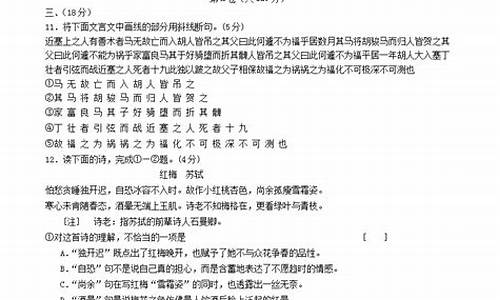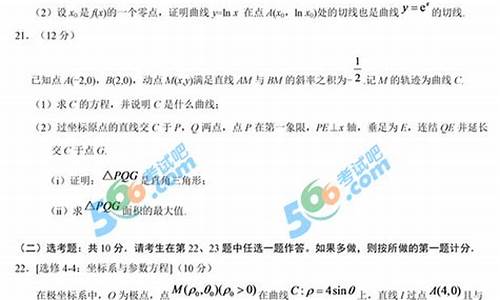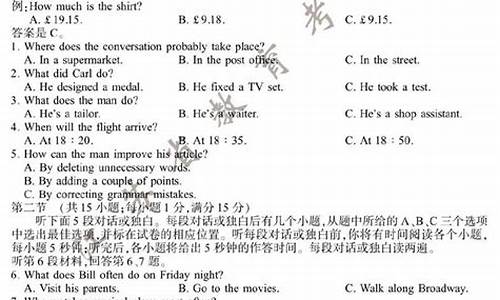您现在的位置是: 首页 > 教育政策 教育政策
状语从句高考题2013,高考状语从句考点归纳
tamoadmin 2024-06-06 人已围观
简介1.高考英语语法省略的用法怎样用?举例2.英文选择题3.有有关状语从句的语法填空题吗?B. whether whether 引导名词从句,常与or 连用。 A. even if 即使 ,尽管 C. no matter 引导让步状语从句,no matter作“无论”、“不管”解,用以引导表示让步的状语从句,常用在下列句型中: 句型中的No matter what (who
1.高考英语语法省略的用法怎样用?举例
2.英文选择题
3.有有关状语从句的语法填空题吗?

B. whether whether 引导名词从句,常与or 连用。
A. even if 即使 ,尽管
C. no matter 引导让步状语从句,no matter作“无论”、“不管”解,用以引导表示让步的状语从句,常用在下列句型中: 句型中的No matter what (who/when etc.)...分别表示“无论何事”、“无论何人”、“无论何时”等,这个从句可以置主句之前,也可以置主句之后。
D. however 然而 ,表转折
高考英语语法省略的用法怎样用?举例
1、while用作连词时,表示“在…(过程)中,在…期间”。
2、用来引导时间状语从句,当主句的主语和while所引导的从句的主语一致时,while从句中的主语、谓语往往可以省去。
3、while还可引导让步状语从句,意思是“虽然,尽管”,含有对比意味。
4、while表示对比关系时,意思是“而,然而”。
例句:
I lived in a hostel while I was a student
我求学期间住在青年招待所里。
扩展资料近义词:when
when读音:英?[wen]? ? ?美?[wen]?
释义:
adv.?什么时候;当 ... 时
conj.?然后;可是;当 ... 时
pron.?什么时候
n.?时间
例句:
When did that happen?
那件事是什么时候发生的?
用法:
1、可用作疑问副词,用来询问某事曾发生或将要发生的时间,引导特殊疑问句;还可用作关系副词引导限制性定语从句、非限制性定语从句和表语从句,表示“是…时候的事”。
2、when所引导的时间状语从句用一般现在时代替将来时,用现在完成时代替将来完成时。
英文选择题
英语中为了避免重复,往往省去一个词语或更多成分,这种语法现象称为省略。省略的情况复杂、多样,综合近年来的高考题,常在以下几个方面对省略进行考查。
一、 考查状语从句中的省略
例1. When first ______to the market, theseproducts enjoyed great success. (2004高考)
A. introducing B.introduced C.introduce D.being introduced
2._____with the size of the whole earth, the biggest ocean does notseem big at all. (2004湖北)
A. Compare B.When comparing C. Comparing D.Whencompared
3.The research is so designed thatonce nothing can be done to change it. (2002年全国)
A. begins B. havingbegun C. beginning D.begun
Key:1.B 2.D 3.D
简析 状语从句中,如果主句的主语和从句的主语一致,且状语从句的谓语动词中有be动词,从句的主语连同be可一起省略,该类状语从句多为时间、地点、条件、方式或让步等,连词为when,while, though, if, unless, although, as if等,后面通常接分词、不定式、形容词、名词等。
例 Look out for cars when (you are) crossingthe street.
另外,在when /if it is necessary , possible 结构中, it is通常省略。
例 Drop in on me if (it is ) possible.
二、 考查定语从句中关系代词及关系副词的省略
例.1.That’s an unpleasant thing to say aboutyour father after _______ he’s done for you. (2004高考)
A. something B. anything C. all D.that
2. Playing tricks on others is ______we should never do.(2004湖南)
A. anything B.something C.everything D.nothing
3. What surprised me was not what he said but ___he said it. (2004湖北)
A. the way B. in the waythat C. in the way D. the way which
Key: 1.C 2.B 3.A
简析 关系代词在限制性定语从句中充当宾语且不位于介词之后可以省略;关系副词 that在先行词reason/ way后的省略。
例 This is the reason why / for which / that/省略he was late. (that 为关系副词,可省略)
三、不定式符号to 的省略
例:1.A computer does only what thinking people _________.(1999上海)
A. have it do B. have itdone C. havedone it D.having it done
2. We’ve missed the last bus. I’m afraid we have no choice but_____ a taxi. (1993上海)
A. to take B.taking C. take D.taken
Key: 1.A 2.A
简析:不定式在感官动词see, hear, feel, watch, notice, look at , listento, overhear, observe 和使役动词 have, make, let 后作宾语补足语时,不定式省略to。
例 I watched him disappear in the distance.
不定式符号to在介词but ,except, besides后的省略。介词but ,except,besides 后接不定式作宾语时,介词前有行为动词do,不定式要省去to。
例We did nothing but/except wait then.
不定式符号to作表语时的省略。当主语部分有行为动词do,作表语的不定式to可省略。
例What I want to do now is find some books to read.
四、考查不定式后动词的省略
例: 1.--- Would you like to go to the Great Theatre with metonight.
--- ______.(1999上海高考)
A. Yes, I would like to go to the Great Theater with youtonight.
B. I’d love to, but I have an exam tomorrow.
C. No, I wouldn’t D.That’s all right
2.--- Does your brother intend to studyGermany?
--- Yes, heintends ________. (1998上海高考)
A./ B.to C.so D.that
3.--- I’ll be away on a business trip. Wouldyou mind looking after my car?
--- Not atall. ________. (1995NMET)
A. I’ve no time B. I’d rathernot C. I’d likeit D. I’d behappy to
Key: 1.B 2.B 3.D
简析 动词love, mean, want, hate, like, wish,expect, hope,try, intend, plan, refuse, prefer, seem 及be glad(pleased, delighted, happy) to等后面接不定式时,为避免重复,常省略与上文相同的动词,只保留to不定式符号。
例--- How about going for a walk ?
--- I’d like to ( go for a walk ) .
句式would have done …, should have done…, ought to have done…,needn’t have done …, used to be …等省略形式为 would have ,should have , ought to have, needn’t have , used to be,要保留不定式后的be或have。
例 ---Are you a sailor ?
--- No, but I used to be (a sailor).
五、对替代词so 及not 的考查
1. --- You haven’t lost the ticket, have you?
--- ______.I know it’s not easy to get another one at the moment.(2004江苏高考)
A. I hopenot B. Yes, Ihave C. I hope so D. Yes, I’m afraidso
2. --- The boys are not doing a good job at all,are they ?
--- ________.(2003北京春)
A. I guess notso B. I don’t guess C. I don’t guessso D. I guessnot
3.--- I believe we’ve met somewhere before.
--- No, ________. (2000北京春)
A. it isn’t the same B. it can’t be true C. I don’t think so D. I’d rather not
Key: 1.A 2.D 3.C
简析 替代词so /not用于避免重复前面所说过的内容,代替肯定的名词性从句。可与动词believe, do, expect, fear, guess, hope, say, speak, suppose, think 等及I’m afraid连用。肯定时上列动词都可与so 搭配,否定时hope与guess只用I hope not 和I guess not 形式,而think ,believe , suppose等词可有两种否定形式 ,即:I think not 或I don’t think so.
例 --- Is he going to studyabroad?
--- I believe so. ( so = he is going to study abroad)
六、 考查虚拟语气中if 及should 的省略
1._____ it rain tomorrow, we would have to putoff the visit to the Yangpu Bridge. ( 1994上海 )
A. Were B. Should C. Would D.Will
2.What would have happened _______ as far as the river bank ?(2001上海高考)
A. Bob hadwalkedfarther B. if Bobshould walk farther
C. had Bobwalkedfarther D. if Bobwalked farther
3.Jane’s pale face suggested that she _____ill, and her parents suggested that she ___ a medical examination.( 1994上海高考)
A. be,should have B. was,have C. should be, had D. was,has
4.____be sent to work there ? (2002上海高考)
A. Who do you suggest B.Who do you suggest that should
C. Do you suggest whoshould D. Do yousuggest
Key: 1.B 2.C 3.B 4.A
简析 在书面语中,当条件从句有were, had, should 时省略if , 把它们提至句首,形成倒装句式。
在含有建议、要求、命令等相关的名词性从句用should + V ,should可以省略。
例 He suggested that she (should ) go atonce.
注suggest表示“暗示” 时用陈述语气
七、 会话中的省略
例: 1.---Guess what ! I came across an old friend at the party lastnight.
--- ______. I’m sure you had a wonderful time. (2004辽宁)
A. Soundsgood! B. Very well C. How nice ! D. All right!
2.--- Let’s go and have a good drink tonight.
--- _____ Have you got the first prize in the competition?(2004重庆)
A. What for ? B. Thanks alot . C. Yes, I’d liketo D. Why not?
3. ---Brad was Jane’sbrother!
--- _____ he reminded me so much of Jane ! (2004浙江)
A. No doubt B. Above all C. No wonder D. Of course
4. If you are planning to spend your moneyhaving fun this week, better ____ it —— you’ve got some bigbills coming. (2004广东高考)
A. forget B.forgot C. forgetting D. toforget
Key: 1.C 2.A 3.C 4.A
简析 省略在会话中广泛应用,解题时应按照问话或答语的具体内容补充完整,做好该类题型一是要注意上下文语境,二是要注意常见句式的省略。英语中常见句式的省略有:
1.It is … (that…) 强调句式中that部分省略。 2.(It is) No wonder … ( 难怪…)
3.(Is there) Anything else ?
4.(You’d) Better do
5.have some difficulty( in) doing, prevent sb (from) doing sth等词组中介词在口语中常省略
例: 1.--- Where did you see him last night?
--- It was in the hotel ____ he stayed.
A. where B.that C.which D. /
2. You can’t imagine the great difficulty I had _____ yourhouse.
A. finding B.found C. tofind D. find
key 1.A 2.A
简析 第1题可以补全强调句式that 部分: It was inthe hotel where he stayed that I saw him last night. hotel后为定语从句。
第2题是对have difficulty in doing sth词组置于定语从句的考查,介词in 的省略加大了该题的难度。
高考链接
1. --- Go for a picnic this weekend, OK?
--- ______. I love getting close to nature. (2004福建)
A. I couldn’t agreemore B. I’m afraid not
C. I believenot D. I don’t think so
2. --- Susan, will you please go and empty that drawer ?
--- _______? (2004 全国I 卷)
A. Whatfor B. What is it
C. How isit D. How come
3. It is easy to do the repair. ________ you need is a hammer andsome nails. (2004天津高考)
A.Something B. All
C.Both D. Everything
4. Unless ______ to speak, you should remain silent at theconference. (2003年上海春季高考)
A.invited B. inviting
C. beinginvited D. having invited
5. The man we followed suddenly stopped and looked as if____whether he was going in the right direction.(2003年北京春季)
A.seeing B. having seen
C. to haveseen D. to see
6. Though ______ money, his parents managed to send him touniversity. (2002 年上海高考)
A.lacked B. lacking of
C.lacking D. lacked in
7. When ______, the museum will be open to the public next year.(2002年 上海春季高考)
A.completed B. completing
C. beingcompleted D. to be completed
8. He made another wonderful discovery, ____ of great importance toscience. ( 1998上海高考)
A. which I think is B. which Ithink it is
C. which I thinkit D. I thinkis
9. If ________ the same treatment again, he is sure to get well.(1998年上海高考)
A.giving B.give
C.given D. beinggiven
10. --- Alice, why didn't you come yesterday?
---I ________, but I had an unexpected visitor. (1997NMET)
A.had B. would
C. was goingto D.did
Key: 1-5.AABAA 6-10. CAACC
综上所述,高考对省略的考查主要对状语从句中的省略、不定式的省略、否定问句的省略回答、虚拟条件句中if的省略及比较级的省略的考查。只有掌握了常见的省略现象及其考查形式,才能以不变应万变,在高考中立于不败之地。
有有关状语从句的语法填空题吗?
这是一道英语高考真题!它的目的是考查条件状语从句中的省略问题。
if not carefully dealt with, = if it is not carefully dealt with,
即省掉了it is。 it 指代后面的the situation.
温馨提示:
“状语从句中的省略” 是高考热点、难点、常考点。
“状语从句中的省略”有两个条件:
① 从句中的动词必须有be,即:is /was /are /were 等;
② 从句的主语必须为it 或者与主句的主语一致! e.g.
1) Fill in the blanks with articles where it is necessary.
由于地点状语从句的主语it 和 谓语 is 符合省略的条件,因此,此句=
Fill in the blanks with articles where necessary.
2) He won't go to her party until he is invited.
由于时间状语从句的主语he 和 主句的主语he一致,而且谓语为is,符合省略的条件,因此,此句=
He won't go to her party until invited.
状语从句填连词练习:(黑体字部分是空)
Fill in a suitable subordinator 填从属连词
1. He said it didn't matter whether we stayed or went.
2. No matter what / Whatever he did, no one paid any attention to him.
3. Although / While I understand what you say, I can't agree with you.
4. Tall as / though he was, he could not reach the apples.
5. Although / Though he is poor, he is at least honest.
6. Even though / Even if the weather is bad tomorrow, John will want to go
7. Though / Although all the world were against me, I should still hold to my opinion
8. If I hadn't stopped her, she would have jumped into the river.
9. Don’t ask me to explain unless you really don't understand.
10. I rained a lot, so that I didn't have to water the lawn.
11. They are hurrying so that / in order that they may not miss the train.
12. The speech is all the more important in that (because) it was made by a man of authority
13. As / Because he was in a hurry, he left his bag in the waiting room
14. It was because he was ill that he didn't go with us
15. You can do the job how / as you like.
16. Please do exactly as your doctor says.
17. Wherever / No matter where there's plenty of sun and rain, the fields are green.
18. He walks as if he were drunk.
19. Hardly / Scarcely had he arrived when he had to leave again.
No sooner had he arrived than he had to leave again.
20. The moment / The minute / The instant / Just as / Directly / Immediately the button is pressed, the mine explodes. 只要一按按钮,煤矿就爆炸。









